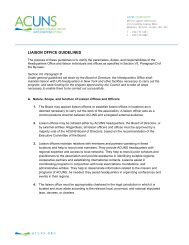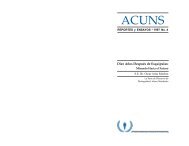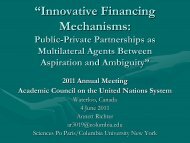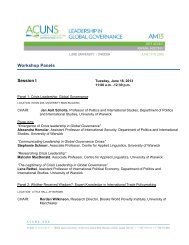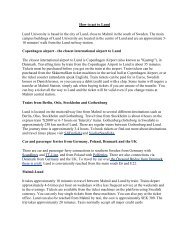E-discussion: Building the future we want with science ... - Unesco
E-discussion: Building the future we want with science ... - Unesco
E-discussion: Building the future we want with science ... - Unesco
You also want an ePaper? Increase the reach of your titles
YUMPU automatically turns print PDFs into web optimized ePapers that Google loves.
PHASE 2 - Culture<br />
What do <strong>we</strong> mean by culture? Establishing a common language<br />
‘Culture’ has been defined in literally hundreds of ways. To set a common ground for <strong>the</strong><br />
debate, participants in <strong>the</strong> e-<strong>discussion</strong> agreed to refer to culture in two distinct but related<br />
senses that draw inspiration from <strong>the</strong> 2001 Universal Declaration on Cultural Diversity 1 :<br />
First in its narrow, functional sense, as an organized sector of activity dealing <strong>with</strong> <strong>the</strong><br />
different manifestations of human intellectual and artistic creativity, past and present:<br />
The arts and cultural expressions, toge<strong>the</strong>r <strong>with</strong> <strong>the</strong> individuals and institutions<br />
responsible for <strong>the</strong>ir transmission and renewal constitute what is commonly regarded<br />
as <strong>the</strong> "cultural sector", a demarcated policy domain concerned mainly <strong>with</strong> heritage<br />
and creativity.<br />
Second, in its wide, anthropological sense, as reflected in <strong>the</strong> people’s ways of life;<br />
<strong>the</strong> different values, norms, knowledge, skills, individual and collective beliefs that<br />
guide individual and collective action. This definition refers to <strong>the</strong> diverse stock of<br />
“intangible cultural capital”, renewable resources upon which <strong>the</strong> people draw<br />
inspiration and through which <strong>the</strong>y express <strong>the</strong> meaning <strong>the</strong>y give to <strong>the</strong>ir existence<br />
and its development.<br />
Participants also agreed to refer to <strong>the</strong> framework of existing international legal instruments<br />
in <strong>the</strong> field of culture, which form an overarching system of cultural governance, based on<br />
human rights, that deals <strong>with</strong> heritage, diversity and creativity. These legally binding<br />
agreements engage Member States in a continuous process of dialogue and cooperation at<br />
<strong>the</strong> international level. 2<br />
Why should culture be part of <strong>the</strong> <strong>future</strong> sustainable development agenda?<br />
Progress in documenting and producing hard data on <strong>the</strong> linkages bet<strong>we</strong>en culture and<br />
development has been slow. Participants in <strong>the</strong> e-<strong>discussion</strong> helped to fill <strong>the</strong> gap and<br />
systematize <strong>the</strong> experience <strong>the</strong>y have accumulated over <strong>the</strong> years. They offered a threetiered<br />
approach to <strong>the</strong> arguments supporting <strong>the</strong> role of culture in fostering inclusive social<br />
and economic development, environmental sustainability, as <strong>we</strong>ll as peace and security:<br />
First, because culture contributes to <strong>the</strong> sustainability of development<br />
interventions and can ensure more sustainable use of resources<br />
1<br />
Accessible at : http://unesdoc.unesco.org/images/0012/001271/127160m.pdf<br />
2 The UNESCO Conventions concern <strong>the</strong> protection of tangible heritage (1972 Convention concerning <strong>the</strong><br />
Protection of <strong>the</strong> World Cultural and Natural Heritage, ratified today by 190 States) <strong>the</strong> safeguard of intangible<br />
heritage (2003 Convention for <strong>the</strong> Safeguarding of <strong>the</strong> Intangible Cultural Heritage, ratified today by 153 States)<br />
as <strong>we</strong>ll as <strong>the</strong> protection of underwater cultural heritage (2001 Convention). The UNESCO normative framework<br />
includes also <strong>the</strong> struggle against <strong>the</strong> illicit international trafficking of cultural property and <strong>the</strong> protection of<br />
cultural property in <strong>the</strong> event of armed conflict (1954 Convention on <strong>the</strong> Protection of Cultural Property in <strong>the</strong><br />
Event of Armed Conflict and <strong>the</strong> 1970 Convention on <strong>the</strong> Means of Prohibiting and Preventing <strong>the</strong> Illicit Import,<br />
Export and Transfer of Ownership of Cultural Property). Finally <strong>the</strong> UNESCO 2005 Convention on <strong>the</strong> Protection<br />
and Promotion of <strong>the</strong> Diversity of Cultural Expressions (ratified today by 128 parties) is concerned <strong>with</strong> diversity,<br />
creativity and development<br />
14



